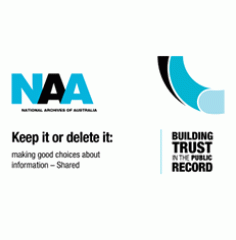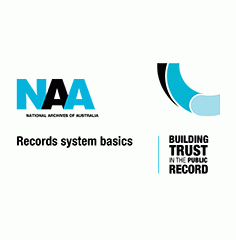Information matters – transcript download (PDF 296 KB)
Welcome to 'Information Matters – understanding your information responsibilities'. A short video from the National Archives of Australia. In this video we'll help you learn to recognise business information, understand why information matters and your responsibilities in managing it.
While carrying out your work, you're creating, sending and receiving business information which provides evidence of work performed by your organisation. Most of this information exists in a variety of systems and locations including: Business systems and databases, for example, client management systems, content management systems and transactional systems, such as payroll and accounting systems; email accounts; websites; social media and cloud-based services and applications; mobile devices and laptops; and USB drives and other storage devices.
With the volume and variety of information in today's digital world, more than ever you're responsible for ensuring the information you create, send or receive as part of your work is available in your organisation's approved systems.
In many systems, capturing business information won't happen automatically so it's important to be aware of your responsibilities when creating and capturing it. For systems not designed to fully manage information, it may be more appropriate to capture it in your Enterprise Content Management System or Electronic Document and Records Management System.
Your Information Management Responsibilities
Everyone working for an organisation, regardless of their level, is required to keep and manage information about their work.
Some business information is created automatically: [Date Created: 15/09/2015 11:45 AM] [a year ago] or it's already created when you receive it from someone else, while other information will only exist after you make a conscious decision to capture it.
You may decide to keep information when you need to show:
- what advice or instruction was given
- what was decided or recommended,
- what happened at a particular meeting.
If you're not sure whether you need to keep specific information, consider:
- Did you write, send or use the information in the course of your work?
- Are you (or someone else) required to act on the information? or
- Is it likely anyone, including you, will need this information in the future?
If the answer to any of these questions is yes, you should keep the information.
So why should information matter to you?
In your everyday work, creating and managing accurate information helps you to:
- find and use it to complete business tasks and processes
- share it with colleagues and stakeholders
- reuse good work done in the past
- use it to support system workflows and approvals
- make better informed decision-making through quicker access to accurate and trusted information, and
- be accountable for your actions as an Australian government employee.
You may ask: why does information matter to your organisation?
Information matters to your organisation, because it's a strategic asset and an economic resource. It's as important as money, property and equipment. Without it your organisation wouldn't be able to carry out its business.
When information is accountably created, managed, described and stored, its potential value increases, enabling it to be shared more easily, and used for other purposes in the future. Like any asset your organisation owns, information needs to be protected from any risks that will make it unreliable, irrecoverable, unusable or able to be accessed by those without need.
Information also provides evidence of decisions and actions taken by you, or your organisation.
Your organisation's information exists within a regulatory, legal, risk and operational environment that includes:
- Legislation
- Privacy and security requirements
- Government policy
- Stakeholder expectations, and
- Obligations to ensure citizens' rights and entitlements.
Now we know why information matters, let's move on to how we manage it.
How to manage Business Information
Your organisation's information governance arrangements, which include policies, processes, standards and people, will help manage information effectively and accountably.
There are also some simple rules you should follow in your day-to-day work when creating and managing business information. Make it full, reliable and meaningful.
When creating information, it's important to build context that helps us understand why it was created and how it's used. Much of this context will automatically be captured by the software when it's created. For example, the creator, the date of creation and who has accessed and edited the information.
But most of the time, you will need to add a title. Adding a title that is meaningful, unique and consistent will help you and others find the information again.
Correct way to write a title:
- Finance Steering Committee – meeting agenda and minutes – January – June 2016.file
Incorrect way to write a title:
Use approved locations
Always keep business information in your organisation's approved locations and systems. This is usually your organisation's Electronic Document and Records Management System but may be any system that has authorised information management capabilities. Information in approved locations and systems can be:
- readily accessed by those who need it for their work
- secured from unauthorised access, tampering, deletion or loss
- related to other information to give context; and
- backed-up or protected from corruption or damage.
If you keep information in corporate locations and systems approved by your organisation, you don't need to worry about how long it needs to be kept, as the information will be managed as part of your organisation's official business information.
If you need to destroy information, ask your supervisor or information management area for further advice. It's also important to remember that information created digitally should remain in digital format, and not be printed and managed in paper.
Understanding the role of supervisors in supporting information management
Supervisors and managers can also play an important role in helping to improve information management practices within your organisation by promoting information management as an essential element of conducting business.
If you're a supervisor or a manager, you should:
- know your organisation's information governance arrangements
- provide training and guidance for staff
- support and encourage good team practices, and
- understand your delegation to approve information management related decisions.
In summary:
We're all responsible for creating and managing information of our day-to-day work by simply:
- titling your information meaningfully
- keeping it in your organisation's approved locations, and
- understanding your organisation's operating environment.
You'll be creating good quality information that everyone can find and use.













